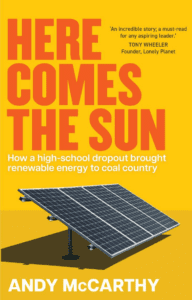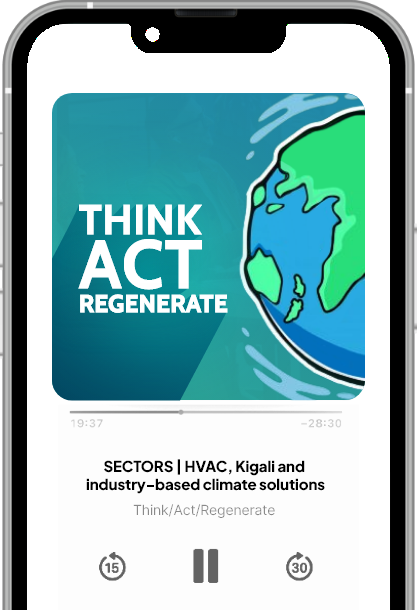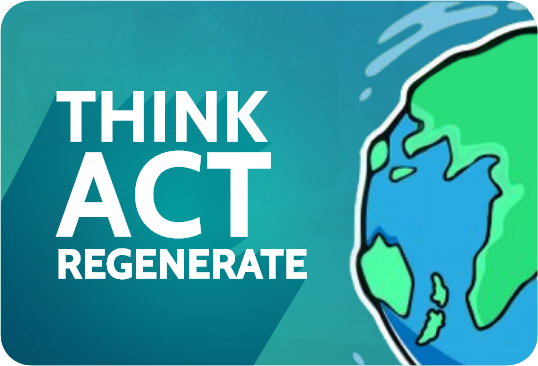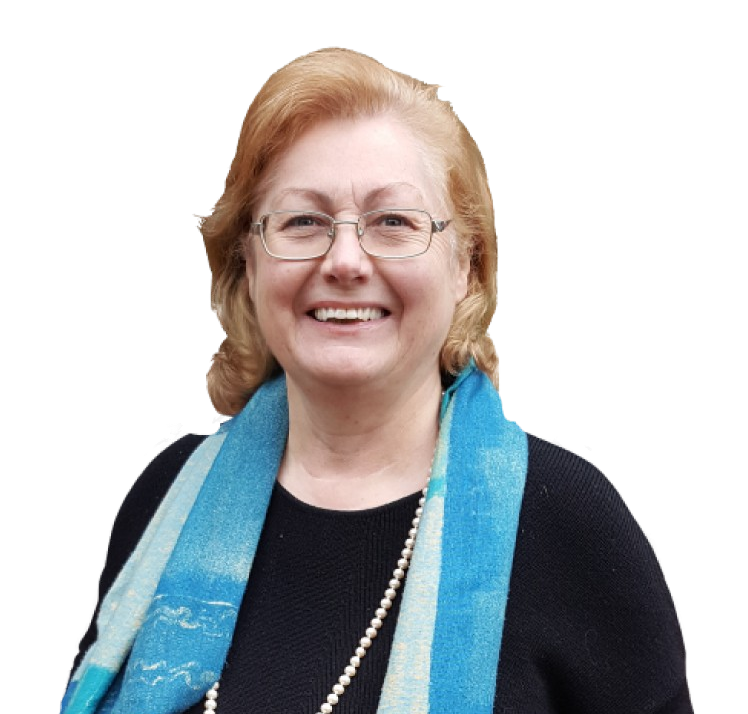
THINK ACT REGENERATE is a podcast by Leigh Baker of ThinkActRegenerate which explores the wealth of regenerative design solutions happening on the ground in Australia and New Zealand, as well as around the world.
Andy McCarthy – founder of Gippsland Solar in 2010 – has told his renewable energy business story (so far) in his recent autobiography HERE COMES THE SUN.
I caught up with Andy at the start of October to discuss what he’s learned and where he sees the next big openings in renewable energy opportunity.
FULL TRANSCRIPT: https://thinkactregenerate.com/interview-solar-entrepreneur-andy-mccarthy-on-the-next-big-renewable-energy-opportunity/#text
LINKS:
Books
HERE COMES THE SUN: https://affirmpress.com.au/browse/book/Andy-McCarthy-Here-Comes-the-Sun-9781923046337
CROSSING THE CHASM: Marketing and Selling Disruptive Products to Mainstream Customers https://www.harpercollins.com/products/crossing-the-chasm-3rd-edition-geoffrey-a-moore?variant=32130444066850
Other links
Recent Think Act Regenerate PODCAST interview on battery as a service: https://thinkactregenerate.com/interview-exploring-battery-as-a-service-opportunities-with-eliot-energy/
FREE Think Act Regenerate INSIGHTS email series: https://thinkactregenerate.com/insights


Andy McCarthy – founder of Gippsland Solar in 2010 – has told his renewable energy business story (so far) in his recent autobiography HERE COMES THE SUN.
He grew a thriving business in the face of disruptive “boom and bust” government funding cycles – and he built it in the heart of Victoria’s coal country.
It’s a great read on the “how” of scaling today’s regenerative solutions for entrepreneurial thinkers.
I caught up with Andy at the start of October to discuss what he’s learned and where he sees the next big openings in renewable energy opportunity.
LINKS
Books
HERE COMES THE SUN by Andy McCarthy: https://affirmpress.com.au/browse/book/Andy-McCarthy-Here-Comes-the-Sun-9781923046337
CROSSING THE CHASM: Marketing and Selling Disruptive Products to Mainstream Customers by Geoff Moore https://www.harpercollins.com/products/crossing-the-chasm-3rd-edition-geoffrey-a-moore?variant=32130444066850
Resources
FREE Think Act Regenerate INSIGHTS – introductory email series: https://thinkactregenerate.com/insights/
A recent Think Act Regenerate PODCAST interview on battery as a service (as mentioned in this episode): https://thinkactregenerate.com/interview-exploring-battery-as-a-service-opportunities-with-eliot-energy/
CREDITS
Original music composed for the show by Ian Hopkinson of HopkinsonCreative.com – used with permission.
TRANSCRIPT
The next multi billion dollar company in this industry is probably going to be like an Uber or an AirBnB where they don’t actually physically own any assets they’re just using technology to move electrons around the grid
Andy McCarthy, founder of Gippsland Solar
*****
LeighB: Welcome to Think Act Regenerate.
In this episode, I’m talking to local renewable energy pioneer and entrepreneur AndyMc from Gippsland Solar. At age 19 – a high school dropout with ADHD – Andy connected his first solar panel, and suddenly found himself powered by a passion. A passion for making clean energy from the sun freely available.
In 2010, after years of working for solar companies, Andy did a tree change and moved to the heart of coal country with his wife Kelly.
They ended starting a renewable energy company called Gippsland Solar. Despite its location, “Gippie Solar” grew into a national business over the next decade. So much so, that in 2009 it was acquired by RACV Solar.
Andy stayed on to handle the transfer, eventually stepping down in 2013 to take a break.
Andy has told his story, so far, in his recent autobiography, HERE COMES THE SUN: HOW A HIGH SCHOOL DROPOUT BROUGHT RENEWABLE ENERGY TO COAL COUNTRY. I’ll put a link to the book in the show notes. It’s well worth reading if you’re of an entrepreneurial mindset.
Andy’s practical positive approach to the business of selling renewable energy and accelerating the developing energy transition really connected with me. So I invited him to join me for a conversation.
*****
LeighB: Hi, Andy. thanks for joining me today. I had a great read of your book.
AndyMc: You got through the book.
LeighB: I’m a book junkie.
AndyMc: Oh yes, you are.
LeighB: On our last call, I think I thrust two in your face.
AndyMc: Yes, that’s right. Appreciate you taking the time to read it.
LeighB: It was great. You brought a new company and were part of bringing a new industry to a new level in Australia.
The thing that actually pinged me was on LinkedIn when you said: “once I started talking about jobs and opportunity, not shoulds”, that you started getting a different result. So I thought that might be a great starting point.
[00:03:15]
AndyMc: All right. For those that aren’t familiar with the journey that we went on, we moved to coal country in 2010.
I married a Gippsland girl, and moved down there for lifestyle to raise a family. But it was pretty clear, immediately when we arrived, that it was the worst place in the world to be starting a renewable energy business. I couldn’t find a job, because there was no solar companies and certainly none that were growing to the point of employing someone. I said to Kel, “I can’t find any jobs. I’m out of options.”
And then Kel said, “Well, if there’s no jobs and there’s no competition, why don’t we start our own solar company?” and that was it.
So we built an office out in the shed and we took a $5,000 loan off our mortgage and bought some business cards and an invoice book, and away we went.
LeighB: how long had you been in the solar game before you made the move down the country?
AndyMc: I started in this industry when I was 19 actually. I spent probably 10 years working for various companies and just developing my skills. Spent a number of years living overseas and adding some life experience to my repertoire.
The minute that I connected my first solar panel when I was 19, I knew that this was going to be my mission – accelerating this world’s transition to renewable energy was something that just drove me.
I didn’t realize at the time would be such vast transition. It would be so meaningful and have so much opportunity. I just did it because I loved it – but I guess there’s a lesson there – when you follow your passion that opportunity tends to follow.
LeighB: Absolutely. There you were, down in the Latrobe Valley, starting a solar business.
[00:04:34]
AndyMc: Yep, didn’t go well for the first couple of years. I can tell you that.
I wouldn’t say people even hated me back in 2010. They just dismissed everything out of hand – they thought it was nonsense. It was just a bit of loony left propaganda, and it would only ever be a niche market for greenies and tree huggers. That was really the perception of renewable energy back then.
And if you told people that it was going to be 40 or 50 or 60 percent of our national electricity mix 13 years later, people would have scoffed at you.
It’s quite remarkable how far we’ve come – and there is a sense of satisfaction this vision that I had for renewable energy future coming to fruition and, proving that we’re on the right side of history way back then when no one believed us.
LeighB: Everything was a challenge. What were the unexpected challenges?
AndyMc: Unexpected challenges. Well, that’s interesting – because I did expect to meet all of that resistance.
I think I did expect at a point in time that, employing people and creating economic opportunity was going to be enough to bring people on the journey. Once we did start enjoying some success and we were becoming quite a decent contributor to the local economy, I kind of just expected that people would just get on board because it was in the best interest of the region.
But it surprised me – and it still surprises me – how much people hold on to this real hatred of energy transition, particularly LaTrobe Valley and I’m sure it would be the same in other coal fired power regions of Australia, around the world as well.
But there are still people in 2024 that absolutely despise everything that we stand for. They think that it’s just a bunch of, you know, just a bunch of woke propaganda or wealth transfer or whatever people want to use.
I just thought by now, you know, we’ve employing, about 30,000 odd people in Australia in renewable energy. and we’ll need to get to 150,000 for us to hit our targets. And I guess it surprises me that some people still don’t think that it’s the future. I don’t understand it it.
I don’t argue with anyone about the science of global warming or climate change any of that. First of all, I don’t have knowledge, to have that conversation. I haven’t earned the right to engage in that debate as a climate scientist. I just trust the science that’s put in front of me.
But my argument to people when they say “ahh humans have nothing to do with global warming” and I say, “Well, so what. What if we make this transition and we transfer to a cleaner source of electricity – a naturally available resource and we created all these jobs and we create self-sufficient homes that are powering themselves off their own rooftop.
And the worst case is that it doesn’t do anything to change the global temperatures. What, have we lost?
Like what’s the worst case scenario? We’ve still made this transition from a finite resource to an almost infinite resource. Best case scenario is that we make this transition and we start to make a difference and create a better planet for our children.”
So when I look at the best and worst case scenarios, I just don’t know why we wouldn’t be doing it. I don’t understand it.
LeighB: I did a lot of reading, about, human systems change – even then it still never ceases to amaze me just how embedded, ” how we’ve always done it” is for the majority of the population.
[00:07:25]
AndyMc: Yeah, and I think it’s also the fear, uncertainty and doubt, you can’t underestimate the impact of that. And it took me a long time.
I would never have understood it deeply if I hadn’t have moved to the Latrobe Valley. I consider that to be a real blessing – getting to live down here and actually walk these streets every day and understand it the consequences of the decisions that we make on regions that have powered the country from coal for generations.
I do a lot of dressing down to environmental groups and, some of those organisations that come here and make big inflammatory statements, but they don’t really understand the impact.
Minister D’Ambrosio – the energy minister in Victoria – came to launch my book about a month ago and she threw the script out. She had a script of notes to read off and she just said, “Look, I’m just going to talk from the heart here”.
And she said “I so deeply appreciate the work that Andy and others do, because frankly, we get to come down from Spring Street, we we make these announcements, we tell people that we’re thinking and we care about their future. And then we come back to Parliament House, whereas people like Andy have to walk these streets every day. and have those conversations with people that are deeply impacted.”
It’s really nice to hear that level of empathy and understand of the issue – because I think there is a lack of understand, or maybe a lack of respect for these regions that have powered the state for 60 or 70 years and they feel like they’re getting left behind.
So when people come down from environmental groups and say “Hey, it’s, a great thing, we’re all transitioning people in the valley.”
Hang on a minute. I don’t see opportunity coming with this transition. I see opportunity leaving.
It took me years to realize that. But once I did, then I started to maybe pull my head out of my backside and maybe learn to meet people where they are. I think Leigh that is the key point.
*****
LeighB: Talking of your book, how did you come to write it?
[00:09:03]
AndyMc: I have described myself as an accidental author. I’d never had any intention of publishing a book. I am not an avid reader, I’m a podcaster and I’m not really big on the written word. It’s just never something that interested me. I didn’t have it on my bucket list.
But during a particularly stressful time on our business journey – and again for those that aren’t familiar, we built our business from the garage of our little town of 2000 people in the Latrobe Valley.
We built it up to about a hundred employees and we were acquired by RACV 10 years later. And then I stayed on for three years as the CEO, managing director and had over 300 people working for us at one point.
So it was an incredible journey, but it was incredibly stressful journey as well.
And there was a time after the acquisition where the greatest of respect to RACV – they treated me very well – but it was just so hard. It was really stressful and the pressure of trying to be the CEO of an RACV company, selling my team a new vision and a new dream. I had such a weight on my shoulders all the time.
And having had some mental health problems in the past, I found myself going back to that place I wasn’t sleeping well for a long time, for months. And someone said to me “the best form of counselling is actually just to start putting your thoughts down on paper of an evening and getting it out of your head.” The book almost started like a journal of sorts.
And that was really as far as I intended to take it. I just did it to get my life back on track and start to become more at peace with my own mind. Then I finished the book right as I left RACV and finished my contract there.
[00:10:30]
AndyMc: And so I had time on my hands and we took six months traveling around the world on a sabbatical with the kids. it was amazing, best six months of my life. But of a morning, Kel was in the gym and the boys were in the pool and I just had some time. So I just started polishing the book up to something that maybe the kids might read in posterity.
Got to the end and friend of mine, who’s a published author, had a read of it and she said “Andy, this is brilliant,you have to send this to a publisher.” And that was the first time that I’d thought about publishing the book – all the way at the end after the editing process, I still didn’t intend to,. But I thought, well, I’ve done all the work and all they could do is say no.
LeighB: Absolutely.
[00:11:04]
AndyMc: Yes. So I threw a Hail Mary and I subverted the submission process and emailed it directly to the managing director of a publishing company called Affirm Press.
And I said “sorry/not sorry, for circumventing the process, but here’s my story if you’d like to hear it, if you’d like to publish it, let’s talk.” And the CEO got back to me four days later and said, “I’ve just read this whole thing in one sitting. The world has to hear this story.” So there we are.
LeighB: And, it would be remiss not to mention again that the book is called, HERE COMES THE SUN.
[00:11:34]
AndyMc: It is. The best part of it naming naming the book Here Comes The Sun is I’ve listened to that song hundreds of times since the book went through a little print.
I love the name because it’s everything that I feel about business and life and transition.
This energy about the transition to renewables, it’s a truly magical thing – and I just think that that’s, probably why this mission has been so captivating for me.
There’s some lovely remixes of it too, if you go on Spotify there, there’s some a cappella versions, there’s a young girl, I can’t remember her name now, just her singing with a guitar doing a version of it and it’s beautiful, the lyrics, the song, everything, I love it.
*****
LeighB: do you have a sense, personally, of what’s next?
[00:12:25]
AndyMc: I don’t really know, Leigh. I don’t spend too much time worrying about it.
I remember when RACV offered to buy our business and my wife Kelly said to me, “Well, you can’t sell the business until you know what’s next.You have to have a plan, otherwise you’ll go stir crazy with ADHD.”
And you know, she just thought that I would end up being, little bit listless or directionless and I needed to have a plan.
The universe has funny ways of throwing things up I just thought that eventually something would find its way onto my path and take me to the part of the journey. And I just trust in that to happen.
Like when I left the business, I never intended on being a published author. Then after publishing a book, I didn’t actually realise the different way that people perceive you when you are a published author and there’s a level of credibility that I hadn’t really come to terms with.
[00:13:09]
AndyMc: But then I found myself doing a podcast with Richard Feidler on ABC Conversations, which is the number one podcast in Australia. And it’s amazing the people that have heard that and reached out with different opportunities they want to discuss or connections they want to build.
I just think life is about saying yes to everything and then it will take you on a path that you never expected. But that’s the beautiful thing about this life that we live.
LeighB: Absolutely.
AndyMc: I have had people try and drag me into politics next. Leigh, my children are not the right age for that kind of life decision. I think they suffered enough.
LeighB: I remember Michelle Obama, at the end of Barack Obama’s presidency, being pressured to go into politics, and she said “after what we’ve been through. Do you think I would do that to my children?”
[00:13:52]
AndyMc: Yes. I think, you know, a lot of my last 13 years have been a fairly selfish pursuit.
I think it’s fair to say the runaway success that our business enjoyed, which on paper looked amazing. Like obviously there’s collateral damage people only see the tip of your iceberg. and that’s fine.
Look, I really didn’t care about much else in life to be honest. I didn’t spend enough time – if I’m being honest with myself – thinking about being the best husband and father I could be, I just wanted to build a business that would change the world.
And I suffered greatly. My own mental health and well being went off a bit of a proverbial cliff at times, but I reflect on the fact that I chose to pay that price for the success of our business. And that’s fine. Like that’s a decision that you make and there’s no complaining,
But it’s when you choose for other people to pay the price the decisions you make. That’s where it becomes unfair.
And that was why that six months sabbatical was the best six months of my life – because I had made decisions that have impacted on my family. To be able to take the kids out of school and take them around the world to the Middle East and really embed them deeply into other cultures and give them that rich experience and just to be there all the time (other than editing a book the morning) was very formative for their lives and it deepened our relationships as a family.
Probably the one thing I would say is in my next stage of life, at least for the next five years – is that I wouldn’t do anything that impacts that heavily on my family again.
*****
LeighB: Do you have an opinion on state of solar in Australia
[00:15:14]
AndyMc: Well, it’s interesting because if you talk to people from around the world, I’ve done podcasts in four different countries they always hold Australia up as being a postcard from the future and a wonderful success story for others to follow.
But it’s, more complex than that. Yes, on paper, we do have the largest uptake of rooftop solar in the world per capita. There’s nearly 4 million systems installed in Australia now, which is nearly 30 percent of homes.
But there’s a tale behind the tale. And that is the merry go round of policy.
From 2007 to 2020, we spun our wheels at the very best – and went backwards probably more accurately – in terms of achieving our ambitions. But also the sugar hits of intensely generous government rebates and incentives, which as soon as the music stops. All these companies just fell over.
2007 was the first year that we really dialed up the stimulus for solar installations and everyone just went “Wow, this is awesome. We’re all so busy making money.”
A thousand solar companies started in that year alone. And I would be absolutely confident in saying that 997 of them are no longer in business. And the worst impact of that is that there’s probably 1. 4 million systems in Australia that are installed by a company who’s no longer in business to support it.
And that’s 1. 4 million households like my mum or my sister that when the inverter fails or they’ve got a problem and they don’t know who to turn to. And that’s the impact of the policy and stimulus merry-go-round that we’ve on. We’ve got to learn those lessons, moving forward because otherwise we create a boom and bust.
LeighB: Almost sounds like there’s business opportunity.
AndyMc: Yeah, there is somewhere, somewhere for someone.
We actually started a business I think we called it solar fix I think the slogan was “we inspect, we clean, we fix”. So we would inspect systems that were working, do panel cleaning and then we would repairs and we would deal with the manufacturer and take on the warranty obligations for them.
Again, the problem with systems being so disproportionately cheap in Australia is that when you tell someone that’s going to cost $3,000 for a new inverter and to bring the system up to code, they say, “Well, that’s more than I paid for the whole system in the first place.”
LeighB: Because it was heavily subsidised.
AndyMc: Yes. And I say, “well, with the greatest of respect, that’s actually the problem.“
But people just can’t justify that investment in their own mind. They should be able to look at that $3, 000 bill and then say, this is going to save me $700 or $800 a year, so it’s worth the investment. But they can only relate it back to what they paid in the first place.
Some businesses are doing a really good job in this space, but no one has really split the atom in Australia on servicing and maintaining existing systems.
LeighB: And that’s because companies who installed them have fallen by the wayside, because they couldn’t survive the boom and bust funding cycle?
AndyMc: Yep. And the other problem is that – when you look at those systems – invariably the companies that are no longer in business also happened to a lot of the really shoddy workmanship.
So these systems riddled with problems. And that’s maybe the reason why the company is no longer in business – because their a warranty and their liability mass just became so great that it was just easy to close the doors. It’s very hard to build a sustainable, profitable business model that takes ownership of those systems.
It almost needs to be an altruistic pursuit to start a business like that – because you are doing it to help people, but to do it in a way that’s profitable, especially with the cost of having electricians out in the field these days. It’s significant impost on business.
LeighB: an interesting challenge. I had sister up country who had that problem. their old solar panels died. it took them about five years to save up for a new system.
Once you’ve had funding for a system, that’s it, you’re off the list for any future funding. If I understand it the system correctly?
AndyMc: That is correct. Yes.
*****
AndyMc: The other interesting thing we’re going to have in Victoria – in about six weeks time I think it is – there’s 88,000 customers who had a premium feed in tariff of 66 cents. They got it in 2009 and it was a 15 year program. So in six weeks, we’ve got 88,000 customers who come off the 66 tariff and go on to about a three cent feed in tariff.
So that’ll be the next opportunity that a lot of solar companies are trying to explore – how do we find the way to maximize that opportunity?
On the positive side, many of these customers have saved thousands and thousands of dollars and have had a very positive experience with their solar investment.
But on the downside, a lot of those people that installed those systems in 2009/10/11 – they’re no longer the ones that are living in the house. The customer who has that house now doesn’t have the same level of understanding or connection to the investment they made, so it’s hard to convince them to spend more money and increase the system size.
LeighB: So does that make batteries a coming coming opportunity at a new level? If you’re not going to get paid for it?
[00:19:54]
AndyMc: Yes, it does. It does. For those customers. the first opportunity is that they probably had 165 or 170 watt solar panels at the time, and now you can replace them with a 450 watt watt panel almost the same kind of physical footprint.
You can put probably eight kilowatts of solar in the same footprint as what originally could only get a four or five. So maximizing the roof space is now going to be the most important thing,
But then, clearly, there’s what we call self consumption. Putting a smart hot water heat pump in, that uses excess solar to heat the water during the day. Obviously a battery if people can afford it.
I always say to people, if you’ve got electric hot water – an old fashioned electric hot water clunker -there’s no justification to spend $18, 000 on a battery until you’ve fixed the hot water.
Hot water is basically like a 10 or 15 kilowatt hour battery on your home that people don’t realize they have. You heat water off peak overnight for 20 cents. But you can actually be using your solar – which is only worth three cents during the day now – and you could be saving a lot of money, and it’s better for the environment.
There’s no point using electricity overnight because when these coal fired power stations close there’s no reason to use electricity overnight, they should be using electricity during the afternoon.
LeighB: Because what’s going to happen is that – when they do close – electricity overnight is going to get more expensive.
[00:21:08]
AndyMc: Yes.
I think back in the eighties and nineties, off peak electricity was one cent a kilowatt hour. For those that can remember, back in the days where we had those old heat bank heating systems in homes everyone was convinced to put electric hot water in and put the elements at night rate because we couldn’t turn these power stations off. So they were just dumping excess electricity into the grid overnight.
What we’re going to see with this renewable energy transition is – within the next 5 or 10 years – there’ll be times in 10 years time I reckon where we’re sitting at 150 or 180 percent of our energy needs during the middle of the day. Which is exactly where electric vehicles and hot water come into play.
People say electric vehicles will kill the grid, but I would happily sit down and have a coffee with any of those people and explain the way that we can use electric vehicles as a solution, not the problem.
LeighB: Yes, it’s a new pattern of thinking.
AndyMc: It is – and like you said before, opportunity.
*****
[00:21:54]
AndyMc: Somehow there is a multi billion dollar business somewhere in managing the transition of usage from electricity overnight to electricity usage during the day.
The next multi billion dollar company in this industry is probably going to be like an Uber or an AirBnB – where they don’t actually physically own any assets – they’re just using technology to move electrons around the grid.
LeighB: The podcast episode before last I did, was with a battery startup entrepreneur Entrepreneur. So you might like to go back and listen to that one.
AndyMc: I will.
LeighB: I’m a baby boomer, but I spent my working life in the tech industry. So when mobile phones came out, I had one because I had to have one. Because it was part of the job, especially when I went freelance.
A more non tech friend of mine spent 10 years laughing at me for having a wanky phone. Then his children got married and his first grandchild arrived. And next time we saw them, he had a phone and he was showing us grandchildren pictures on Facebook.
In diffusion of innovation, getting an innovation across from the early adopters to the early majority is about finding a beachhead, a niche. And that was the thing that moved him from laughing at me for having one of those stupid wanky phones to “Oh, look at the grandies.”
AndyMc: Yes, you’ve got to find out what motivates people.
LeighB: And that’s marketing challenge.
I very much see a lot of where we are now as – we’re still working on comprehending the marketing challenge. Let’s stop talking about what people should do. And let’s start finding those beachhead niches.
[00:23:32]
AndyMc: I think it’s interesting at the moment because that challenge I was talking about, which is the greatest challenge of our generation. is how to shift people’s usage – millions and millions of kilowatt hours – from overnight to during the day.
With the greatest of respect to the companies out there, a lot of the early adopting companies at the forefront of trying to manage this shift and get in at the ground floor. Largely they’re being run by engineers and data scientists and people that deeply understand it the technical problem and the reason why we need to do it.
I would say that maybe some of those companies need to spend more time on marketing and storytelling- because unless you can explain really succinctly to the customer why this is a necessity, they’re not going to come on the journey.
We need to do it, but the customer doesn’t really know why we need to do it yet.
LeighB: It’s not in their face yet.
[00:24:30]
AndyMc: I understand it the technical elements of this industry, but I’m not a tech head. And I think sometimes that maybe helps when I think about the complexity of this problem, having to shift all of that load, I bring something digestible.
I say to customers that “2PM is the new 2AM” – and then I explain why that is. I give them something memorable – a soundbite – it sticks in people’s minds.
They can see: “Why do I need to do this? Because 2PM is the new 2AM. “
LeighB: Like “Orange is the new black.”
AndyMc: Exactly, yes.
*****
[00:24:58]
AndyMc: I’m actually doing some keynote presentations these days and some workshops and that sort of thing. And one area that I’m really passionate about is sitting down with a bunch of people in an innovation team and saying, “OK. Let’s write the challenge up on the whiteboard” – (The challenge I just explained to you earlier)
I say “In the next 10 years, here’s what we need to do. Build me an idea. Give me a business model. Give me marketing strategy about how to create a business that will capture that.“
You get people thinking, wow there’s, there’s tens of billions of dollars of opportunity within that one issue – and someone’s going to get there first.
LeighB: It’s like your job is not to convince the retail market of that. Your job is to convince the next generation of startup entrepreneurs in their incubators.
[00:25:47]
AndyMc: Yep, exactly. And I can give you all of the problems we need to overcome.
The biggest problem that we have with electric vehicles, very simply, is nothing will ever be more convenient than charging while you sleep, but the sun shines while we’re awake.
So that’s a big problem. And how do we overcome that?
We have to find ways to incentivise people to charge their car – whether they’re at home, parked in the street or parked at work. They have to have the car plugged in during the day. I know people commute, but you are spending a lot of time with your car stationary during the day.
And if we set up the electricity grid, where during the day they’re incentivised to charge from the grid and at night they’re incentivised to use their car to run their home, there’s a lot of opportunity there.
LeighB: So you want corporates building that into their salary packages.
AndyMc: Yep, exactly. So this is the fuel card of the future.
LeighB: “Part of the benefits coming to work from us is that we’ll give you an E.V. charging point so you can charge your car during the day.”
[00:26:41]
AndyMc: Exactly. it’s the fuel card of the future.
And you can have a charging station at home. You can have a charging station at business. A lot of businesses now, council fleets and things like that, are filling the whole roof with solar and then having their fleet cars plugged in during the day with smart technologies.
Because the problem is if you plug in 12 electric vehicles that are all drawing 20 kilowatts at the same time, your maximum demand [exceeds supply limits].
LeighB: Boomph.
AndyMc: Yes. So now we’ve got software that can say “by 5 PM, all of these cars need to be at a hundred percent” and it will just regulate the charge into each car. So you’re never taking more than a hundred amps from the grid.
Without getting too nerdy about it, that’s where the next opportunity is if the grid is awash with renewables during the day, we need to find a way to utilise it.
LeighB: It’s an interesting marketing problem, isn’t it? “Where is the beachhead?”
[00:27:26]
AndyMc: he biggest problem at the moment is that it’s a very, very COMPLEX problem that we face. It’s one of the most complex problems that we’ve faced since the industrial revolution.
I have very little confidence we can actually get customers to really care. Like they just don’t care, they just want to be able to get the cheapest form of reliable electricity at any stage without impacting quality of life.
LeighB: What Henry Ford is reputed to have said is: “If I’d listened to what my customers wanted, I would have developed a smarter horse.”
AndyMc: Yeah, that’s right. Yeah, exactly.
LeighB: this really is “A technology led sustainability revolution” because it needs the smart technology – which we have.
It maybe just needs a few more technology entrepreneurs discovering that there’s more fun to be had making this technology revolution work than writing another consumer app.
[00:28:21]
AndyMc: Absolutely. And I think it also comes back to hardware.
When I first started driving, there was a parking meter – a green parking meter – at every car park in major towns and centers.
I can imagine a pop up charging station that comes up from under the ground – whenever you pull up the sensor picks it up, the charger pops up, you plug your car and its connected to your electricity account and you get credits and debits – either using your car to power the grid or using the grid to power your car.
LeighB: There’s a lovely picture London of a very old fashioned looking light pole, painted dark green and lots of ornate wire work. But what’s in the cylindrical base, is a charging station.
AndyMc: I’ve seen that. It’s beautiful. that’s where it’s going.
You know, you could probably make 20 or 30 dollars a day by using your car intelligently to supplement the grid. When you think about the opportunity, people could have zero electricity bill for their home and their car, if they were be able to be part of this solution for us.
LeighB: So that’s the real offer to consumers – not just have a electric vehicle because it’s good for the environment, but it’s your side gig, You don’t have to drive for Uber, just power something.
[00:29:27]
AndyMc: I think taking the environmental conversation out of it is – I firmly believe – the path to success.
And I say this is someone who cares deeply about the environment. It hasn’t always driven me, I’ll be honest, but it’s something I discovered when I got into renewables and sort of thought about the bigger picture.
But if we keep talking about how “we have to make this transition because it’s good for the environment” then we’re just going to get bogged down in culture wars forever. My kids will still be having the same conversations about lack of political leadership and all those things we’re having right now.
Take the take the ideology, out of it. It just makes sense.
LeighB: Politicians do not deliver disruptive economic innovation at global scale. They build the infrastructure they have to build after the change has been proven.
[00:30:10]
AndyMc: I don’t want to delve into politics much, but I believe politicians in general this day and age are probably so concerned about not wanting to put a foot out of line that they forget to put a foot forward.
I think there’s potentially a lack of courage these days because the system doesn’t reward courage as well as it should, and I think that’s a real problem. And this is not a comment about either political party or any of the politicians out there – just the system.
LeighB: It IS a system. When you look at the party system, and you look at where does the campaign funding come from – they do what they have to do.
AndyMc: Yes, absolutely.
LeighB: another of my, little rants is: for goodness sake, understand it the system!
AndyMc: Yeah yeah.
LeighB: The most powerful place to change a system is in the mindset that creates it – not in the regulation. And again, politicians don’t create new mindsets – they support the status quo.
*****
[00:31:16]
AndyMc: I feel like consumers and businesses are going to be the one that lead us through this energy transition because that bold vision works really well in business.
The most successful business people are the ones that have a bold vision before anyone else can see it. And they’re off the start line before anyone else even realises there’s a race. And they enjoy the rewards from that.
And so I feel like the businesses and the innovation will actually be the ones that lead us through to the next phase of our electricity grid.
LeighB: Yes.
[00:31:35]
AndyMc: One thing I can tell you for sure Leigh is that the future of our energy grid is decentralised. It is not centralised electricity. Yet we’re still having these conversations about building centralised power generation – of whatever.
LeighB: It’s like still having a conversation about centralized computers.
AndyMc: Yes, exactly.
LeighB: I remember the days when there were centralized computers – and when the mainframe overloaded, all the data entry and word processing stopped across the business.
AndyMc: The main reason I don’t think centralized generation works for our future is that customers can’t see it and they can’t feel it.
It’s almost like a version of the trickle down effect where we say “If we build these centralised generation facilities, you’ll get the benefit of lower power bills” and customers are like, “Well, how come my power bills have only been going up for the last 15 years?”
I’m obviously biased because this is my area that I’m passionate about – but putting solar, smart hot water and batteries on people’s homes means they get the direct benefit of their investment immediately on their power bill. And they can see it.
The problem is that they don’t have to share as many of those spoils with the big end of town who’ve made the investments in these companies. It’s a bit too democratic and socialist I think for the big companies to get behind it.
LeighB: Well, if you’re a big company, you want to stay big.
AndyMc: and some of these companies have made billions of dollars of investments and they don’t like the customers reducing the power bills and they’re missing out on the clip of the ticket.
LeighB: it’s going to be a different world with different value propositions and we’re going to look back and say, “It’s like they used to use horses move people around.“
[00:32:57]
AndyMc: But if you take the business interest out of this and focus on the consumer, this approach, of decentralizing the market and putting solar and batteries on people’s homes and businesses in their communities – they’re getting the benefit directly.
Other than not helping big businesses to make a big profit, there is no reason, no reason that we shouldn’t be doing that first and foremost.
Even if you had to subsidise it, every dollar you invest subsidising solar and battery on someone’s home – where the power is being produced and used at the same point – will save us at least that much in not having to upgrade the grid and the transmission distribution network.
LeighB: And increased resilience going forward.
AndyMc: Yes, exactly.
I live in a town up in the hills. For three weeks we had a power outage in our town after a little tornado came through. And I’ve had six major outages this year.
There’s a dozen homes in our little town that have all got solar and batteries. They’re the only ones with the lights on. and at that point it’s hard to put a price on that.
LeighB: It’s capital C convenience, isn’t it?
AndyMc: Absolutely.
*****
LeighB: Okay. Well, we’re probably running close to time.
What question haven’t I asked you that I should have?
AndyMc: Have you got a curly one I’m not expecting here?
LeighB: No, but I come in with my expectations and my questions and my interests, and you may have something that you want to say, but I didn’t ask you that question.
[00:34:17]
AndyMc: The one thing I would say in closing is that I think we need to remember that energy transition at its heart, really is about people.
And sometimes in the technological debate, we worry about things like grid infrastructure and, whether it’s going to be coal or offshore wind or nuclear or renewables.
I think we actually forget the, main point of transition is it’s about people. It’s about creating opportunities. It’s about giving people clean low cost, reliable electricity.
I think if you come back to the core premise of “is this good for the consumer? Is this what the consumer wants in the long term?” then every decision that you make should become easier.
AndyMc: I think when you get all these other polluted interests in between, and political capital or leverage or expediency. Whatever it may be, it definitely impacts on what is the actual objective here? Which is to make everyone more self sufficient, and create a sustainable source of electricity.
LeighB: I absolutely agree with you. The real challenge is the human systems change, and our human systems – for better or for worse – are biologically evolved to maintain the status quo at all costs – until the better offer comes along.
[00:35:24]
AndyMc: I think if we want to start telling the story more effectively, we we need to tell the stories of people who’ve embarked on a career in renewables.
They’re living in the Latrobe Valley, they’ve had a wife and bought a house and had two kids and they’re reinvesting back into the community and they have a sustainable job with a good salary. And they’re doing it in renewables.
I think if people can see a prosperous future, then they won’t be scared of transition at all. They’ll see it as being a remarkable, positive thing.
LeighB: I think so too.
I want to say thank you very much for your time.
AndyMc: It’s been great.
LeighB: It sounds like you’ve got some new technology startups to inspire.
AndyMc: I might sit down and do a brainstorm after this conversation. Leigh, you got me all inspired.
LeighB: . you might need to find an incubator or two to go and harangue.
AndyMc: Yes.
LeighB: OK Andy. Thanks so much for your time today.
AndyMc: it’s been great to chat.
*****
[00:36:14]
LeighB: This conversation with Andy McCarthy was fascinating. It affirmed to me that entrepreneurs change the world, whether they’re small business operators, corporate intrapreneurs, or, “citizen entrepreneurs” powering community cooperative efforts.
I look forward to finding out what Andy is inspired to do next.
One of my takeaways was the power that doing what you love can create.
Another was understanding the scale of the challenge of decentralizing energy infrastructure and solutions.
We live in interesting times and the world changes super fast. Who would have thought that it has only taken 14 years to have renewable energy delivering 40 to 50 to 60 percent of our national energy mix?
Today’s commercial regenerative solutions are full of opportunity – for great businesses, for good careers, for community development and enrichment.
Knowing the scope and scale of today’s rich smorgasbord of solutions is the first step to getting your piece of the action. Understanding the tools to turn ideas into successful business innovation in human systems is another.
Once you understand the straightforward design principles behind today’s hundreds of individual solutions and applications, you’ll be able to start seeing high impact opportunities all around you.
If that sounds like something that interests you, but you don’t know where to start, then check out the free Think Act Regenerate INSIGHTS email series through my website. Or keep listening to this podcast where I’m recording audio versions of each insight.
I’m Leigh Baker and I’ve enjoyed being your host for today.
If you like this episode, then please leave a rating and review so you can help other people find their road to opportunity. now it’s over to you to start exploring for your best opportunities to be a regenerative solutionist.
Be excited. Be very excited.












